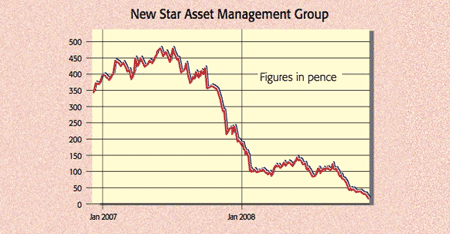
How the mighty have fallen. Hailed as a stable for fund management stars, New Star Asset Management (LON:NSAM) is in deep trouble. Once traded at 219p, the shares have lost 98% of their value in just 12 months. Having halted trading in its International Property (IP) fund last week, this week things got worse. The fund’s founder, John Duffield, tried to persuade the Financial Services Authority (FSA) to suspend trading in New Star shares following a news leak that it was renegotiating terms on its massive debts, estimated at £236m. That move failed and the shares plunged.
The troubles stem from the firm’s decision to borrow £300m not long before the property and equity markets nosedived. The money was used by a then-confident Duffield to return cash to shareholders. He pocketed £45m. Since then the fund has been hit by a triple whammy of tumbling asset prices, mass redemptions – £75m is estimated to have deserted the IP fund in the month before redemptions were halted – and deteriorating credit markets, which have forced the fund into debt renegotiations. New Star’s funds under management have dwindled rapidly from £19.8bn on 30 June to £14.3bn by mid-November.
Despite these woes, the good news for investors in New Star funds is that money used to buy its trust units is ring-fenced. So even if the company were to go bust, the funds are protected by a separate trustee. And it’s their job to ensure that assets held on behalf of investors are legally registered with them, rather than with any of New Star’s fund managers. As such, says Mark Dampier at Hargreaves Lansdowne, “it’s not like a bank”. And there is some precedent to reassure investors. Back in 1995, Barings went bust under the weight of Nick Leeson’s rogue trading. However, the fund-management arm escaped largely unscathed, and still trades under its own name today.
In the highly unlikely event that this ring-fencing safeguard fails, investors are also protected under the Financial Services Compensation Scheme. This offers 100% protection on the first £30,000 of investors’ money, then 90% on the next £20,000. However, that assumes that New Star goes bust. That outcome looks to have been avoided for now thanks to a restructuring agreement struck between Duffield and New Star’s lenders. So if you already hold New Star units, most experts recommend you hold fire, rather than sell. But it’s a sad end for a company started in 2001, claiming it would provide investors with “superior returns”.